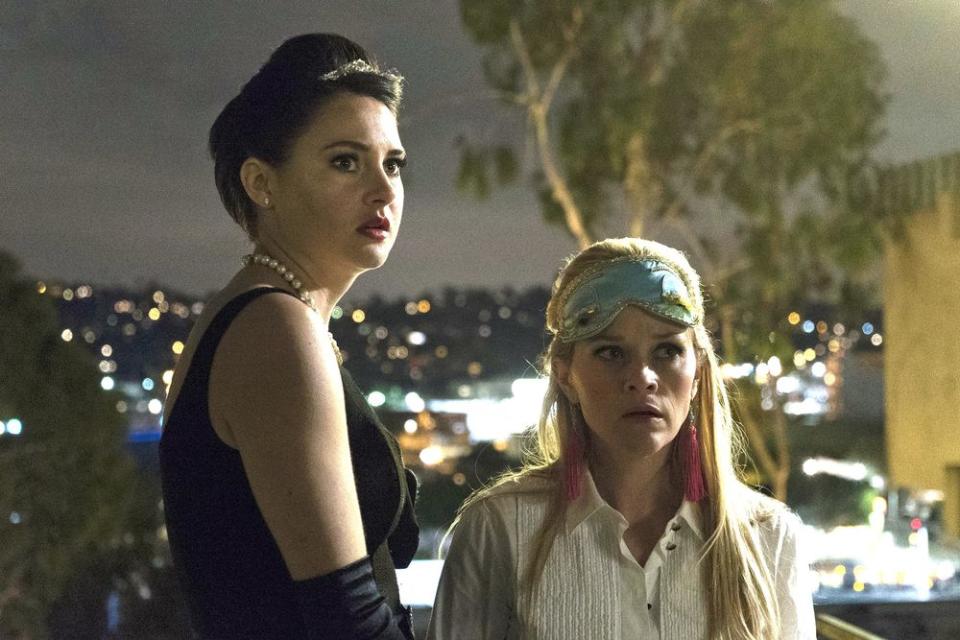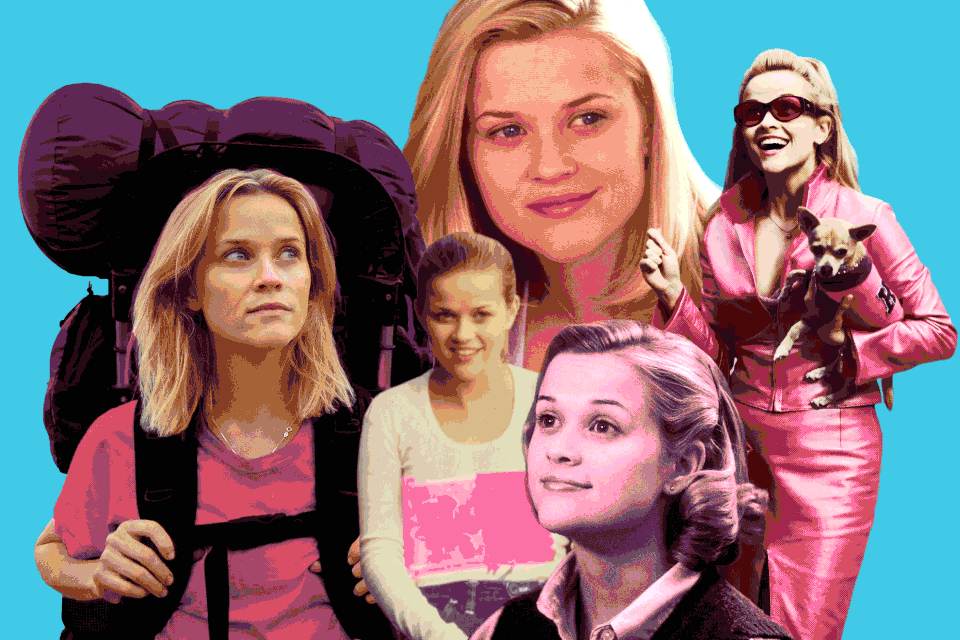Reese Witherspoon's movies ranked by EW reviews
Every Reese Witherspoon fan has a favorite version of Reese Witherspoon. Some are die-hard Elle Woods stans who will quote Legally Blonde until their last day on Earth (what, like it’s hard?). Others love to feel highbrow while indulging in the gratuitous little grudges of Big Little Lies. And then there’s the contingent who can’t let go of those Friends cameos — the very same fans who will be first in line to buy an Apple streaming subscription.
But regardless of your particular allegiance one thing is true: Reese Witherspoon has been in a great variety of movies. She’s played serious, she’s played funny, she’s even done horror that one time. And EW’s esteemed critics have been there every step of the way — ahead, we’ve picked out some of her choice movie roles (and one TV show because we just had to) and ranked them by their official grades. Check out how they stack up and read our O.G. take.
Election (1999): A
From the vault: “Alexander Payne’s scathing tragicomedy about a smug overachiever running for student-council president and the high school teacher who can’t stand to see her win builds a perfect, off-kilter universe — it’s a first cousin to Rushmore. And, like Payne’s 1996 gem Citizen Ruth, it’s a sophisticated morality tale in which neither side has a monopoly on right or wrong. Reese Witherspoon is terrifically steely as the infernally perky candidate; Matthew Broderick takes a career-deepening turn as a sneaky adult.” —Lisa Schwarzbaum
Wild (2014): A-
From the vault: “I felt a little frisson of dread when I heard that Wild was going to be made into a movie. How could Cheryl Strayed’s incandescent memoir about hiking the Pacific Crest Trail possibly translate to the screen? Ravaged by her mother’s death, Strayed had embarked on the 1,100-mile trek almost impulsively, and her tale is largely internal, ‘a primal grab for a cure, for the thread of my life that had been severed,’ she writes. ‘I could feel it unspooling behind me — the old thread I’d lost, the new one I was spinning — as I hiked.’
I shouldn’t have worried. Director Jean-Marc Vallée (Dallas Buyers Club) has made a movie that adheres to Strayed’s book in almost every way. That’s not always a good thing, by the way — faithfulness often leads to leadenness. Vallée has done the opposite, delivering a film that is both graceful and gutting. Wild, which was adapted by novelist-turned-screenwriter Nick Hornby, is even set up like Strayed’s book, with her story slowly emerging in layer upon layer of flashbacks as she walks. Witherspoon ditches her sunny persona before she laces up her first mountain boot and plays Cheryl with real grit, drawing you in from the opening scene, in which she rips off a battered toenail. There’s been much talk recently of the 2014 Reese-aissance; Wild is all the proof you need that Witherspoon has indeed found creative rejuvenation.” —Tina Jordan
Walk the Line (2005): B+
From the vault: “For a long time, the Hollywood biopic was a corny, synthetic, quasi-reputable genre. Recently, though, warts-and-all movies like Ray and Kinsey and Capote, which have had the daring to show how their subjects’ human failings were integral to their greatness, have raised the bar for biopics — for their authenticity and dramatic power. Walk the Line, starring Joaquin Phoenix as country-music legend Johnny Cash and Reese Witherspoon as his muse, singing partner, and stubborn romantic foil June Carter, is a big, juicy, enjoyable wide-canvas biography with a handful of indelible moments, but it’s just compelling enough to make you wish that it had attained the level of artistry of those other films.” —Owen Gleiberman

Big Little Lies (2017): B+
From the vault: “Kidman and Woodley deliver moving portraits of still-life women, paralyzed by trauma and avoidance. Witherspoon is marvelous in a rare role that allows for comedy and drama. Her character recalls two career triumphs: the spark of Legally Blonde‘s Elle Woods trapped inside a retrograde version of Election‘s Tracy Flick. She flails for significance through her kids and grudges against a hard-charging working mom (a sparky Laura Dern) and her ex-husband’s new wife, a neo-hippie yoga instructor (Zoë Kravitz).
Just when you worry the show is a pageant of ugly clichés about female rivalry, it gives you a poignant, nuanced scene to deepen the whole. Can the whodunits offer anything more interesting than just shocker payoffs? TBD after four eps. Big Little Lies invests you in mysteries and the renewal and re-liberation of its women. Hopefully it can transcend to big little truths, too.” —Jeff Jensen
Home Again (2017): B
From the vault: “Filmmaker Nancy Meyers is unmatched at delivering a certain kind of cinematic cream puff: dewy dramedies in which smart, pretty people fight (but never too meanly), fall in love (they can’t help it!), and always seem to have just come back from the farmers market (could those snap peas be any sweeter?).
Or she was unmatched, at least, until now. Home Again is actually the product of her 30-year-old daughter, first-time writer-director Hallie Meyers-Shyer, though it might take a film-studies degree and a DNA swab to ferret out the difference. Reese Witherspoon‘s Alice Kinney is a classic Meyers heroine in nearly every way. A plucky, adorably neurotic blonde freshly separated from her self-absorbed record-executive husband (Michael Sheen), she’s just moved from New York into the sprawling Los Angeles home of her late father, a playboy auteur whose onscreen muses once included Alice’s mother (Candice Bergen).” —Leah Greenblatt
Fear (1996): B
From the vault: “The message is more complex and insidious in Fear. In this effectively erotic thriller from director James Foley (Glengarry Glen Ross and the upcoming The Chamber), Reese Witherspoon is cuddly soft as Nicole, a Seattle sweet sixteener ready for boys but fiercely guarded by her watchdog dad (William Petersen). Still, David (rapper/underwear model Mark Wahlberg), the boy who awakens her desire, at first seems nice. And certainly sexy; a scene of David arousing Nicole on a roller coaster is hot.
But Dad has doubts, which turn into convictions, that the kid is serious trouble (David’s so dangerous, he drives a death-trap Corvair). Yet efforts to keep the two apart only push Nicole even more deeply into danger. David, of course, is deranged bad news. And Fear climaxes in a baroquely violent showdown as Dad defends the family against the crazed fury of a young man whose sexual hunger has gone out of control. The subtext: Just don’t do it. (I can’t even begin to translate the message to poor old dads.)” —Lisa Schwarzbaum
Cruel Intentions (1999): B-
From the vault: “O youth! O dialogue! O brave teen sex romp that has such literary ambitions in’t! Writer-director Roger Kumble’s foxy, snotty, enjoyably trashy update isn’t the second or even the third movie to adapt Choderlos de Laclos’ 1782 novel about sexual manipulation among spoiled aristocrats — Roger Vadim’s Dangerous Liaisons (1959) and Milos Forman’s Valmont (1989) came before.
But Cruel Intentions is the first to move the story from gilded 18th-century Paris to moneyed contemporary Manhattan and set the players in high school. It’s the first time we’ve ever heard Valmont report on his erotic adventures like this: ‘If you’re asking if I nailed her, the answer is no.’
And it’s certainly the first time the heartless Marquise de Merteuil — a fangs-baring role previously occupied by Glenn Close and now rented by Buffy the Vampire Slayer’s Sarah Michelle Gellar as Kathryn Merteuil — describes her position in society comme ca: ‘I’m the Marcia f—ing Brady of the Upper East Side.’ —Lisa Schwarzbaum
Four Christmases (2008): B-
From the vault: “In the crassly enjoyable Four Christmases, Reese Witherspoon and Vince Vaughn are forced to put in a yuletide visit to each of their divorced parents. It’s four home-for-the-holidays comedies in one, and the variety-pack structure works for the movie: Each nightmare household has a wacked flavor all its own, and none wears out its welcome. (The entire film runs 89 minutes.) The halfway humane joke is that Vaughn and Witherspoon have avoided marriage and kids, so what’s missing from their lives is the messiness of…life.
Enter the coarse, bawdy corrective that is the Christmas family megaplex comedy. The quartet of house parties are sprinkled with witty actors like Jon Favreau, alarmingly convincing as Vaughn’s mohawked sociopath brother, and Mary Steenburgen, who gives Witherspoon‘s pious mother a touch of erotic gumption. It’s a pleasure to see Vaughn play an actual character—a nervous motormouth who speaks in loop-the-loop sentences he uses to talk himself into things. Those sentences are the sound of an actor trying, in his way, to grow up.” —Owen Gleiberman
Legally Blonde (2001): B-
From the vault: “Elle not only makes it through law school, of course. She triumphs, winning friends and influencing people through a combination of glinting highlights, sturdy self-confidence, and, it turns out, real brains packaged in silly clothes. I’d be happier for future scholars of hair color everywhere if screenwriters Karen McCullah Lutz and Kirsten Smith (10 Things I Hate About You) took more risks and gave Elle more of a contour, making her either sharper or more rounded, or if first-time feature director Robert Luketic messed with the unflaggingly light tone some more.” — Lisa Schwartzbaum

